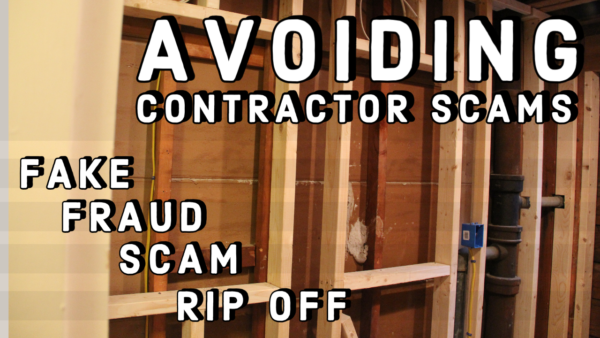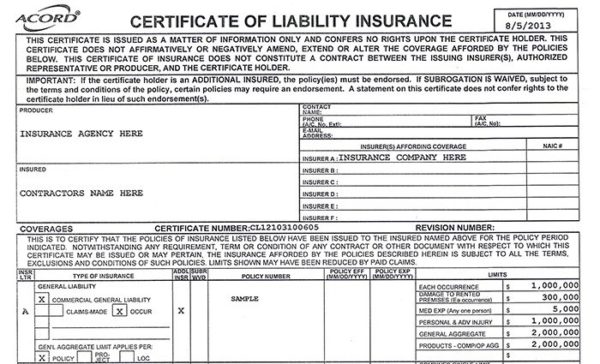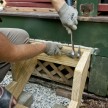Contractor SCAM
How To Avoid A Contractor Scam
True Story: A group of men, reportedly with Irish accents, have been knocking on doors around town offering residents services to work on their home, from chimney work to roofing. They promise to cut you a deal on work around your home, demand cash upfront, then jack up the price once work gets started. a day or two later, the house is torn apart and their nowhere to be found. In my neck of the wood we refer to these unscrupulous characters as gypsies, and its a definite contractor scam.
Telltale Warnings Of A Contractor SCAM
If a contractor tells you something that’s too good to be true, it probably is! LOOK – only a small percentage of contractors are bad apples and even less are gypsies. Fortunately, scammers and con artists are pretty easy to spot – as long as your frugality doesn’t blind you to the telltale signs.
Below are some red flags to help you identify fraudulent contractors:
Contractors Who Knock On Your Door For Work
Most legitimate contractors do not go door to door for work. Often these types of approaches are gypsy scams and the “pretend contractor” will offer a low price and pressure the homeowner to a quick decision.
In this case, don’t make a rash decision. Check the contractor’s name and business address, “Google them,” and call the number on their business card. Oftentimes these numbers are not real, and the business name on the card does NOT have a real street address.
Ideally, contact legit contractors for input on the repair, get other quotes, and check references!!! Questions To Ask A Contractor
Not every contractor who might come knocking on your door will have a scam, but I’m skeptical.
Having Left Over Material From A Previous Job
This hoax is usually run by driveway paving companies, whose materials, hot-top asphalt and concrete, can’t be returned to the supplier. So, the crew pulls up to your house with a load of leftover products and quotes a great price to resurface your driveway on the spot.
Often times the price they offer seems too good to be true, but I guarantee you the work will be shoddy. Usually, they did not use the proper equipment to flatten he asphalt and the driveway starts heaving and cracking the next year.
The key here is never to hire a contractor on the spot, whether it’s a driveway paver or contractor. Take your time to check contractors out, check references, and make sure they have a good reputation and do quality work.
Ask For Money Up Front, Demands Cash
This is the most common scam, the contractor explains that because he has to order materials and rental equipment to get the job started, he needs, say, 30%-50% of the project price upfront.
Once you’ve paid, one of two things happens: He disappears on you, or he starts the work and comes up with extra work needed.
To protect yourself ensure your contractor uses a contract that includes a payment schedule, with the dates and the amount of each payment stated in dollars.
In MA, any deposit required to be paid in advance of the start of the work cannot exceed one-third of the total contract price, or the actual cost of any material or equipment of a special order or custom made nature, which must be ordered in advance of the start of the work to assure that the project will proceed on schedule.
Progress payments should be made after significant work, and the final payment cannot be demanded until the contract is completed to the satisfaction of all parties.
No Contract
Contractor scam red flag – avoid anyone who says a contract isn’t needed.
Make sure your contract outlines specific work done, materials used, a price breakdown and a payment schedule. While some smaller subcontractors [repair techs] may not work with contracts on a regular basis, larger projects need them.
In MA any project I work on larger than $1,000 technically requires me to produce a contract. Click here, if you’d like to learn more on How To Write A Construction Proposal.
No Building Permit
You’re legally required to get a building permit for any significant construction project. That allows building officials to visit the site periodically to confirm that the work meets building and safety codes.
An unlicensed contractor may try to skirt the rule by telling you that it’s not needed, or ask you to apply for a homeowner’s permit, an option available to do-it-yourselfers.
But taking out your own permit for a contractor job means your responsible for monitoring all the inspections — since the contractor doesn’t answer to the inspector, you do.
Getting licensed is not a hard thing to do and contractors that don’t do it are lazy, cheap or not organized.
Always demand that the contractor to get a permit, this will weed out unlicensed contractors and give you the added protection of an independent assessment of the work. Ask for proof or look online at your state licensing board’s site to make sure a potential contractor has a license to work in your area if a license is required.
No Insurance
Every professional general contractor you work with should have two types of insurance. Liability and Workers Compensation Insurance.
General liability insurance ensures that your property will be protected in case any damage happens during the project. Worker’s compensation insurance protects a general contractor’s workers in case they’re injured on your property.
This protects your property from damage and if someone is injured on your property.
Extras and Unforeseen Conditions
The job is already underway, perhaps even complete, when this one hits. Suddenly your contractor informs you that the agreed-upon price has skyrocketed. He blames the discovery of structural problems, like a missing beam or structural issues, or design changes that you made after the job began.
Changes to the project mid-stream mean that the contract scope has changed. These changes should be handled at the time of the change in the form of a change order. If you can’t do that, at least agree on the changes, and cost in written communication, like email.
This is a situation that is a REAL issue in the trades. Unforeseen conditions are a real thing but may unscrupulous, lazy or inexperienced contractors us it a catch-all.
Nearly all standard construction contracts have a provision for unexpected site conditions. Generally, the provision will include a description of what is meant by an unexpected or concealed condition, what the contractor should do when such a condition is discovered, and the process to be followed once the condition is confirmed by the owner.
Experienced contractors, for example, bathroom remodelers, know what to expect on a bathroom remodel. To come back to you and say that they didn’t account for new insulation, subfloor replacement or minor structural work [Extra work] is just poor business tactics.
Many times, this contractor is honest but is not organized enough, solvent enough, hardworking enough or experienced enough to account for these items in his contract. Although these contractors are sincere, the consequences of a low bid are broken promises, bad work, and busted budgets, which in my opinion are often the same as when you hire someone truly unscrupulous.
How To Handle Unforeseen Conditions
If you do the same work all the time you should know what to expect and include it in your written scope of work section of your contract. It shouldn’t be an extra.
When unforeseen conditions do arise, I refer to a standard section in my contract by stating that prior to moving forward the homeowner shall be notified of the condition in the form of a change order. I typically handle these as time and material basis. If the conditions require special testing, such as lead paint or asbestoses – the work stops until the material is tested and deemed safe. The client pays for this testing.
Low Bids
Get three quotes – we all grew up with that advice. This is solid advice if you do not have an established relationship with a qualified, professional contractor that you’ve used before and trust. If you have this – you don’t need three quotes – hire them!
I suggest you create a scope of work and use the same specifications, materials, and labor for each bid, so contractors can bid apples-to-apples. If you don’t have a clear understanding of the scope then hire a contractor for a consultation and the sole purpose of creating a written, detailed scope of work for you. Then offer them the opportunity to bid the project.
If you get a bid that’s a lot less than the others, there’s usually a reason for it. The cheapest quote is never the best deal. While it might be a contractor scam, there are other reasons for really low quotes, here’s a few of them:
- They “spit-balled” the price – warning that they may be lazy, disorganized, complacent
- They might not have a clear understanding of the scope
- They plan on doing minimal [i.e. not replacing old pipes, wires or insulation to cut corners
- They might cut corners
- They might not have insurance
- They might use bad materials
- They might pay employees under the table
- They may do this regularly to get the job and get charge you a ton of extras
Get at least three references for each potential contractor and actually check them. Ask about the quality of the work, how the work has stood up over time and what it was like to work with the individual. Ask about extras and professionalism.
What Should You Do If You Suspect A Contractor Scam?
Documentation is the best thing you can do. Call your local building inspector for advice or reach out to a trusted friend in the trades for a second look at the work or the contract.
Save all communications between you and your contractor, take notes of all conversations, and photos of the work stages, progress, and problems.
If you suspect a contractor scam or your contractor is clearly being dishonest, ban him from the job site, and report the matter to the Better Business Bureau, the local building inspector, and the state attorney general’s office. Contact your lawyer to find out about what your rights are regarding the work contract.
Knowing What To Look For – Contractor Scam Red Flags!
Unfortunately, fraudulent contractors are a plague in my industry. If you’re hiring a contractor it’s important to do the proper research and be aware of the red flags that will help you identify potential scammers, as well as lazy, unprofessional or shoddy workmanship.
How To Work With Your Contractor
Sample Contractor Proposal Bid














